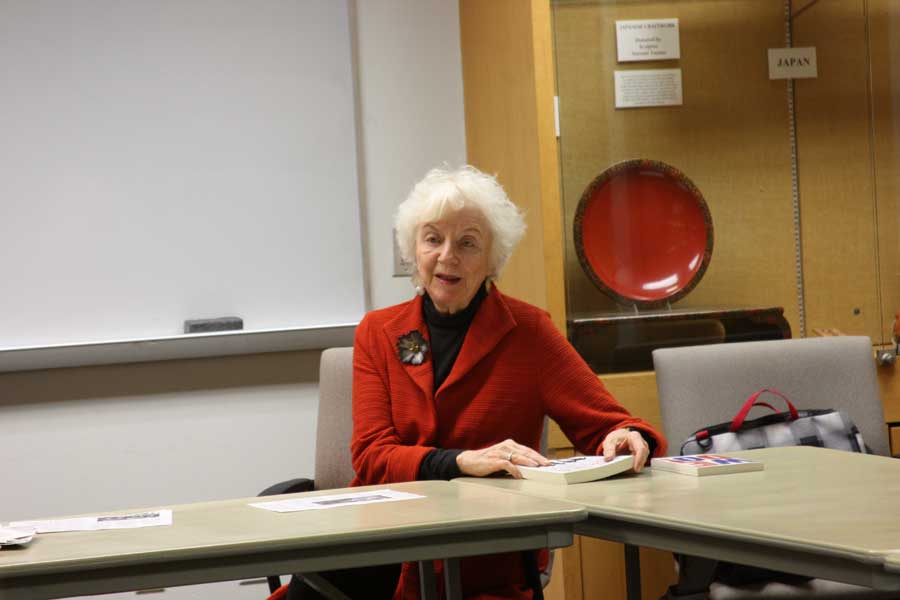Former Vermont Governor Kunin: “I don’t know how to retire.”
Former Vermont Governor Kunin
Leader. Motivator. Advocate. Steward. Feminist. Public servant. These words and many more shot out of the projector and onto the photographs displayed at the far end of the room. The room was full of political science majors and professors who all watched as the same face materialized in and out of existence on the screen. The face aged ever so slightly with each picture that flashed by, until a photograph appeared that was nearly identical to the eighty-year-old woman sitting in front of it all.
Madeleine May Kunin is a name every Vermonter should recognize, or at the very least have some hazy recollection of. She was the first, and so far only, female Governor of Vermont, serving from 1985-1991. At the time, she was also the first Jewish woman to be elected governor of an American state, period. From 1996 to 1999 she became the United States ambassador to Switzerland, the same country where she was born in 1933.
Recently, Kunin has written several books: “Pearls, Politics, and Power” in 2008, and her most recent, “The New Feminist Agenda” in 2012. Currently, Kunin is the James Marsh Professor-at-Large at the University of Vermont. Despite her already busy life, on Monday, Nov. 18, she came to Johnson State College.
“I don’t know how to retire,” Kunin said when asked about her full work schedule.
The conversation with Kunin kicked off with a series of short clips from the recent Vermont Public television produced documentary: “Madeline M. Kunin: A Political Pioneer.” These clips showed Kunin through the various stages of her very active career, starting with her first political position in 1972, when she was elected as a Vermont State Representative. At that time, Kunin said one of her prime motivators was to involve more women in politics. Environmental policies and the women’s movement further influenced her.
However, she was no quite satisfied with this position. “If I really wanted to help, I had to get on the Appropriations Committee,” said Kunin.
Soon she was elected minority whip of the State House and placed on this committee, along with another future governor: Jim Douglas. She then served two terms as Lt. governor, and ran for the big seat in 1982 against Richard Snelling, and lost.
“The most important thing I did was to find the courage to try again,” Kunin said about the loss.
And try she did, winning the race for governor in 1984. In office she made a variety of reforms, including several environmental and educational acts, as well as the creation of Dr. Dinosaur medical insurance.
Each clip was followed by commentary from the woman herself.
Women in executive positions, Kunin explained, have to walk a fine line. On one hand, they have to be soft enough to stay feminine, but tough enough to handle a job usually associated with men.
On this, Kunin said, “[That was] the question I always faced: Was I tough enough?”
A question and answer session soon followed, with topics ranging from climate change, gay rights, the tea party, the performance of the current Vermont administration, and student loans.
When asked she was asked about current political gender biases, Kunin said, “We have come a long way since I was governor.”
She went on to say that she believes gender bias for executive positions at a state level is no longer an issue in today’s campaigns, but there is still a strong male tilt on the national level.
“I hope to live long enough to see a woman president,” said Kunin.
The conversation then switched to some of the defining national moments that Kunin lived through in the 60s and 70s. A moment that particularly stood out was her recollection of the John F. Kennedy assassination.
“We were all glued to the T.V,” said Kunin. “People were crying in the streets [and] it just seemed so senseless.”
The impact back in 1963, she explained, was none too different from the attacks of Sept. 11, 2001.
Her years as governor were the proudest moments of her career. She said that she opened doors for other female politicians in Vermont and the nation at large.
On political activism and the apparent apathy of younger generations, Kunin said, “It is always risky to stick your neck out, but it is more of a risk not to.”
She ended the whole conversation with a positive note, saying, “My mother always told me: ‘Anything is possible in America.’ And I still believe that.”



